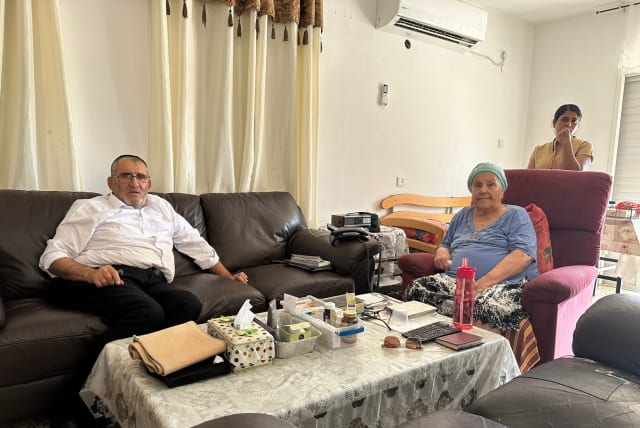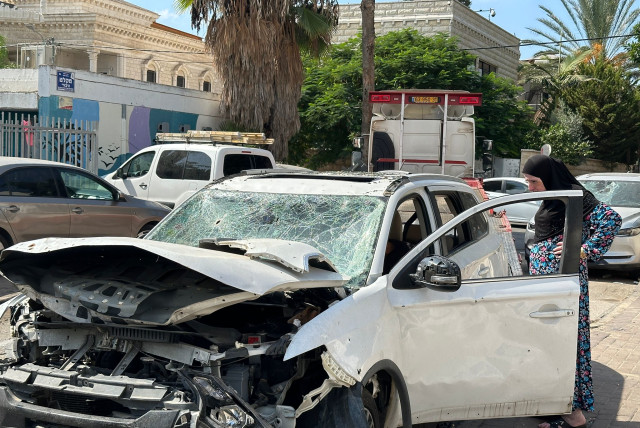WATCH: Israelis praise cross-cultural unity amid fears of division, terrorist threats

“I haven’t seen this kind of thing since the Germans,” says a 91-year-old who came to Israel decades ago after living through the Nazi occupation of Tunisia
Driving through the city of Ramla in central Israel, we find ourselves on a small residential street. At first, amid the old buildings and expected wear and tear, a white SUV catches our eye. The hood is gone, glass is everywhere, and the mangled body is riddled with holes. It’s a scene reminiscent of the aftermath of a Hollywood shootout.
Then, looking down the street, we see another damaged car. A closer look at the houses reveals far more damage than previously noticed … and a black patch of new pavement finally brings the full picture into frame.
This quiet neighborly street was struck by a rocket, fired by Hamas terrorists in Gaza.
“At 7:05 in the morning, there was a siren and we got up to run to the shelter,” Ghassan Bakr, an Israeli Arab business owner and patriarch whose car and home were badly damaged in the rocket attack, tells The Media Line.
“But in moments, everything went flying,” he continues. “We couldn’t see anything, only black. We couldn’t tell where the missile came from. The car exploded upwards and fell down on its side. It caught on fire and everyone was running in all directions. My son was wounded in the leg. A neighbor was also injured in the leg. A piece of flesh from his leg flew to the other yard, which is ours. We picked it up with our bare hands to bury it.”
Bakr and his family run several businesses in Ramla and in Tel Aviv. But everything changed on Saturday, Oct. 7, when Hamas launched thousands of rockets into Israel and invaded southern towns, killing at least 1,300 Israelis, mostly civilians, and taking more than 100 into Gaza as hostages. Since then, Bakr and his family have been focused on rebuilding their lives.
The power line on the street is new, Bakr says, as he takes The Media Line on a tour of the damages. He explains that it came down and caused a blackout amid the attack. The fire that erupted from the white SUV, one of roughly a dozen vehicles Bakr says were destroyed, threatened to explode a set of natural gas canisters that were exposed after the rocket’s impact.
A group of electricians, equipment installers, builders, and scrap collectors are busily working to clear the rubble and repair the home as we walk by. Windows are blown out, and the front door is badly damaged and cannot close. There are shrapnel holes of all sizes across the face of the building. The white SUV’s hood, as well as a piece of the rocket, can be found on the rooftop on the other side of the building, some 50 yards away.
While touring the property, several other neighbors pass by, including Jewish and Arab children and parents who have been injured, one of whom has lost a hand. Bakr’s son Kaesr, who was wounded in the attack, and their neighbor Bilal, whose brother’s leg muscle was blown into the Bakr’s yard, decline to comment on their experience in the attack. Both Kaesr and Bilal say the event is too fresh and traumatic to recount at this time.
No trouble condemning Hamas
But Ghassan, Kaesr, and Bilal have no trouble condemning Hamas terrorists for their actions. Ghassan points to how Hamas’ attacks do not differentiate between civilians and soldiers, nor based on religious belief or any other label. These comments dispel concerns of potential riots like those seen in May 2021, when mobs of Arab Israelis and mobs of Jews rampaged through mixed Jewish-Arab cities, attacking members of the other group and destroying their property. The three men urge Israeli leaders to learn the importance of unity from their example.
Ghassan blames divisions in the country on government officials like Itamar Ben-Gvir and Bezalel Smotrich, both from ultra-nationalist religious parties. He says that had they not been so divisive, the Hamas attack may not have occurred in the first place. Either way, he says, now is the time to come together.
“We’re here in the shelter with the whole neighborhood. It’s enough. Enough. There are kids. … It doesn’t matter if they’re Arab, Jewish, Christian. It doesn’t matter. We’re all human. And our blood is being spilled in the streets,” he says.
Emilia Marcel-Sofer, the Bakrs’ 91-year-old next-door neighbor, agrees. “Forget Arabs and Jews. Right now, we’re all together. Don’t think about it. I don’t think about it,” she tells The Media Line.
Marcel-Sofer came to Israel in 1949 after surviving the Nazi occupation of Tunisia. She expresses pride in the unity between Arabs and Jews that has blossomed on their street.
“We go down to the shelter, Arabs and Jews, and we’re all like family. We eat together. We drink. We’re neighbors,” she says.
Recounting her harrowing experiences from the rocket strike, Marcel-Sofer says she was alone during the initial blast on Saturday morning. She never heard the sirens, she says, and even if she had, it wouldn’t have helped. It takes her a few minutes to cross the street to the public shelter. It wasn’t until later that available neighbors came to check on her.
“We went to sleep and then in the morning hours there was a huge boom,” she says. “I thought the house was falling. From bed, I got up and went to the opposite wall. A few minutes later, I came out and saw the door to my bathroom had been completely blown off its hinges. They’re screwed in, not nailed. It tore clean off and hit the floor. I thought I would die. I grabbed my heart. I haven’t seen this kind of thing since the Germans.”
Marcel-Sofer says that windows in her kitchen and at the front entrance were reduced to dust, much like in the Bakrs’ home. Likewise, the front door is heavily damaged, and a spot in the kitchen where Marcel-Sofer often sits now bears a reminder of how close she came to injury, or worse.
A small piece of shrapnel, no bigger than a peanut, flew through the sliding doors by the dining table—taking out a chunk of metal in the door frame, passing through wooden seats, and finally wedging itself into the wall.
In the back rooms, windows were all blown out or cracked, including in Marcel-Sofer’s aide’s room.
Rajie Rajan, Marcel-Sofer’s live-in aide from Kochi, India, has been in Israel for four and a half years. She says this is the first time she’s ever witnessed anything like this.
“We don’t know what happened,” she tells The Media Line. “When we awoke, we heard the alarms. But we didn’t know what was happening. It was unexpected. … And outside we heard crying. I’m afraid that it will keep happening, even though I trust in this country.”
As of the time of this report, Hamas terrorists in Gaza have launched well over 5,000 rockets toward Israeli population centers, from the towns surrounding Gaza, to central Israel, Jerusalem, northern Israel, and even on occasion the West Bank.
Israel, in turn, has conducted thousands of targeted airstrikes against what Jerusalem says are Hamas infrastructure strongholds. Given the densely populated nature of Gaza and Hamas’ policy of using civilian infrastructure for military purposes, mosques, hospitals, and residential buildings have also been struck by Israel.
The counteroffensive, which Israel is calling “Iron Swords,” is expected to expand into a protracted ground war in Gaza.
Jerusalem Post Store
`; document.getElementById("linkPremium").innerHTML = cont; var divWithLink = document.getElementById("premium-link"); if (divWithLink !== null && divWithLink !== 'undefined') { divWithLink.style.border = "solid 1px #cb0f3e"; divWithLink.style.textAlign = "center"; divWithLink.style.marginBottom = "15px"; divWithLink.style.marginTop = "15px"; divWithLink.style.width = "100%"; divWithLink.style.backgroundColor = "#122952"; divWithLink.style.color = "#ffffff"; divWithLink.style.lineHeight = "1.5"; } } (function (v, i) { });

